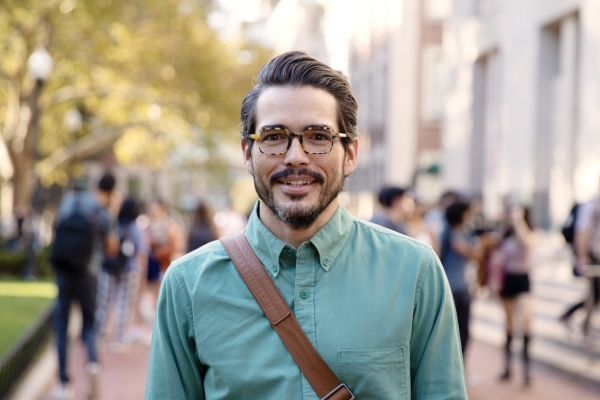
Emma Asher
In this series, we speak with professors who lead different sections of the Core Curriculum to learn what they love about engaging with College students. This month we chat with Jerónimo Duarte-Riascos, an assistant professor of Latin American and Iberian cultures who has taught Contemporary Civilization for the last four years. He specializes in researching modern and contemporary artistic practices, with special attention to those practices’ literary and visual manifestations in Latin America.
What is the best part about teaching the Core Curriculum?
It’s two things for me. First, it gives me access to a pool of students that I would not have access to if I were only teaching in my own department. One of the things that’s so powerful about the Core is having a learning community of students from different backgrounds and interests; it is really powerful in terms of the ways in which you can approach and analyze the texts. It creates an incredible learning dynamic for the students, and for me as well. I think that’s something that you can really only get in these kinds of classes.
The second thing is that teaching the Core also gives me access to a generation that’s different from my own and allows me to better understand the ways in which that generation approaches opportunities and challenges and possibilities. As I teach the Core again and again, I have started to see some generational variations within students that I find very illuminating.
How do you bring your own spin to teaching Contemporary Civilization?
Something that’s very important for me as a teacher of CC is to approach the texts not only as documents that help us better understand the history and tribulations of what we call Western civilization, but also discussing how those texts are present in our contemporary experience. To that end, I design a couple of smaller exercises that allow for student participation. For instance, in each class we do a case study; each student will bring an event, a phenomenon, an object — mostly from contemporary culture — that they see in dialogue with the text that we’re discussing, and then use that to trace connections and to ask questions about the relevance of the text and how the text can help us approach this problem. For example, we’ve recently discussed “W.A.P.” — the song by Cardi B and Megan Thee Stallion — in light of Aristotle’s ideas on ethics and politics. Another exercise is students will bring in what we call a tangential text — one that is not usually a scholarly document, but rather something that is circulating in culture — and use it to draw connections to the main text. So we use songs, classical literature, contemporary literature and things like that, which are off topic but allow us to get a better insight into the material.
Also, I use a blog which students use to post all their assignments. The idea is that they have access to what their peers are saying and the way in which their peers are approaching the texts. I think that’s been quite successful and the students enjoy it too; it’s useful for them when they’re preparing for their final papers and stuff like that — it’s a good way to create memories about the discussions that we’ve had.
What has been your favorite Core Curriculum teaching moment?
I enjoy teaching Plato, because at first the text seems so detached from contemporary experience and often students seem to think that it has nothing to do with them. But as discussions move on, it’s always very illuminating to see how they come to a realization of how Platonic our interactions are and how present this text — that seems really foreign and ancient — is in our day-to-day interactions.
For something more specific, I like to see how students make sense of the materials with regard to their own experiences with knowledge and growing up. For instance, a couple of semesters ago, we were discussing Descartes — the questioning of certainties — and one student spoke about how he, for a very long time during his childhood, thought that cats were female dogs, and how correcting that core principle of his sort of changed his understanding of domestic animals and more. The ways in which students make sense of the texts are always very powerful moments for me.